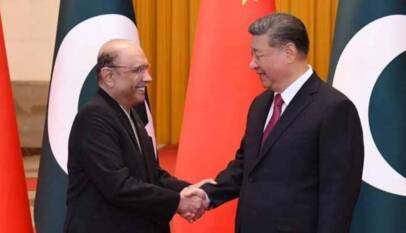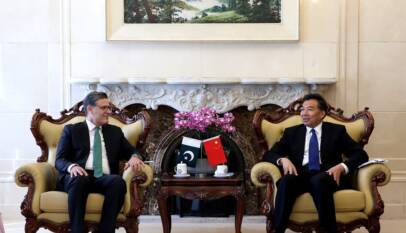Pakistan realizing renewable energy goals through CPEC: Expert
Muzaffar Ali, chairman of Energy Engineering Department of University of Engineering and Technology, in an interview with Xinhua, said that Pakistan is realizing its dream of producing sustainable energy through CPEC. He said that the share of renewable energy would jump to 30 percent till 2030 from the current 4 percent. He stressed the need to explore untapped renewable energy resources in the country and appreciated China for its support to Pakistan in this regard. He said that CPEC energy projects have boosted socioeconomic development and called for the transfer of Chinese technology to Pakistan to further enhance Pakistan’s capacity to become a producer of renewable energy.
ISLAMABAD, Dec. 17 (Xinhua) — Numerous energy projects under the China-Pakistan Economic Corridor (CPEC) are playing a pivotal role in promoting Pakistan’s renewable energy goals and low-carbon economy, a Pakistani expert said.
CPEC is paving the way for Pakistan to achieve its ambitious target of increasing the share of renewable energy in power generation to 30 percent till 2030 from the current 4 percent, Muzaffar Ali, chairman of Energy Engineering Department of University of Engineering and Technology, Taxila, told Xinhua.
“China has in recent years been investing Pakistan under CPEC in energy sector with special focus on producing non-polluting energy by utilizing clean resources including solar, wind and hydro, and the two countries are further strengthening their cooperation in renewable energy development,” Ali said.
He said there was a strong need to explore the untapped renewable energy resources in exigency to support burgeoning economic development in the country, and China has been helping Pakistan cultivate a strong driving power for socio-economic development besides taking care of the environmental protection.
“The energy projects have not only strengthened the national economy and generated thousands of jobs across the country, but also pushed Pakistan towards greater energy independence,” the academic said.
Stressing on the nature-based solutions to mitigate the adverse effects of climate change, Pakistani Prime Minister Imran Khan said at the Climate Ambition Summit 2020 last week that his country has been preferring hydro projects rather than coal-based power plants to generate clean and low-cost energy.
Pakistan became one of the leading countries to install new hydropower capacity recently with the majority of the projects executing under CPEC, providing the greatest share in the renewable energy projects in the country, Ali said.
The total installed generation capacity of hydroelectric power in Pakistan surged to 9,389 MW in 2018 from 6,902 MW in 2017, registering an increase of 36 percent in just one year, according to Pakistani officials.
“China is committed to promoting environment-friendly energy and cooperating with many developing countries including Pakistan to boost their power generating capacity as well as providing them with clean solutions,” the scholar said.
He said as one of the most vulnerable countries to climate change, Pakistan should prioritize its energy generation methods and enhance capacity to produce clean energy in order to meet growing demand without degrading the environment.
To give further impetus to the country’s renewable energy sector, Ali believed that Pakistan has a lot to learn from China as the Chinese government has been revitalizing and successfully implementing renewable energy and moving towards a low-carbon economy.
“Giving incentives and subsidies to domestic renewable energy producers is a prerequisite to witness growth in this sector,” he said, adding that the Pakistani government needed to make policy reforms to attract local and foreign direct investment in the renewable sector.
“Additionally, transfer of technological innovations and skills from Chinese companies to local manufacturers of renewable energy can also greatly help Pakistan attain its renewable energy goals,” Ali said.
He said despite being rich in clean energy resources and having great potential for development, Pakistan faced shortage of the required capital, whereas Chinese companies are looking for better investment opportunities in joint ventures across the world including Pakistan.
“In such circumstances, there would be a win-win situation for both China and Pakistan and would lead to regional socio-economic development in the latter.” Enditem
Chinese company, NEVs begins vehicles’ deliveries in Pakistan’s major cities
China’s BYD, a global leader in New Energy Vehicles (NEVs), and Pakistan’s Mega Motor Comp…













